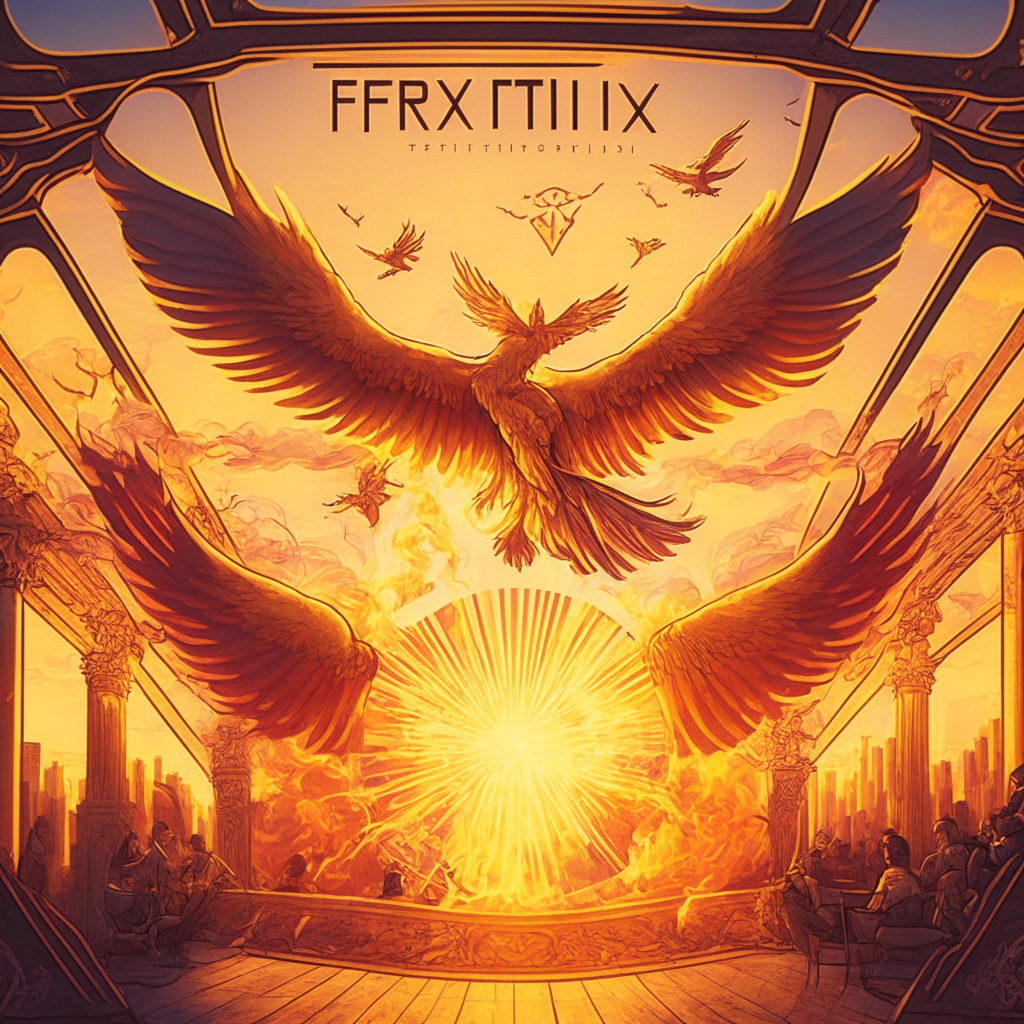The Lightning Network, a Bitcoin layer 2 protocol, aims to address Bitcoin’s scaling issues, such as high transaction fees and slow blocks. While promising, it remains experimental, and a more pragmatic view suggests that it may not solve all types of transactions. Diversified thought and constant innovation keep the cryptocurrency space robust and resilient.
Search Results for: River
Bitcoin Downturn Amid US Debt Ceiling: Impact and Future Predictions Explained
Bitcoin experiences a downturn below $27,000 as investors assess U.S. debt ceiling deal and employment report impacts. JPMorgan research anticipates strong retail demand up to the next halving event in 2024, while Binance’s new appointment, Richard Teng, focuses on navigating regulatory challenges and bolstering the exchange’s legitimacy.
Crypto Meets Formula 1: Mysten Labs’ Impact on Racing and Fan Engagement
Web3 infrastructure firm Mysten Labs partners with Red Bull Racing, introducing blockchain technology into Formula 1. This collaboration enables fan engagement through staked tokens and showcases the growing influence of crypto and Web3 in the sports industry.
Sui and Formula One’s Red Bull Racing: Revolutionizing Fan Experience or Risky Venture?
Sui, a blockchain platform, partners with Formula One’s Oracle Red Bull Racing team to create innovative digital experiences for racing enthusiasts. The collaboration highlights the growing trend of sports teams teaming up with crypto and blockchain companies, revealing potential for increased fan engagement, despite possible volatility and regulatory challenges.
The Great Debate: Treating Crypto Assets as Securities by Default in the EU
A study commissioned by the European Parliament suggests treating crypto assets as securities by default, applying stringent EU governance and authorization rules. The report highlights regulatory challenges in the complex, cross-border crypto industry and raises questions about addressing decentralized finance, staking, and non-fungible tokens within the upcoming Markets in Crypto Assets (MiCA) regulation.
Crypto Market Volatility in 2023: Exploring Causes, Remedies, and the Rise of Ether
In 2023, heightened crypto market volatility is driven by factors like US debt ceiling negotiations, Asian regulatory shifts, and Turkey’s political landscape. Ether’s deflationary stance weakens its correlation to Bitcoin, possibly marking a long-term regime change in supply-demand economics between the two digital assets.
Russia Shifts from State-Owned Crypto Exchange to Private Sector Regulations: Pros, Cons & Conflicts
Russian lawmakers abandon plans for a state-owned cryptocurrency exchange, opting to regulate existing private enterprises instead. This shift aims to minimize risks of sanctions, cyber attacks, and market monopolies, potentially signifying a new chapter in Russia’s relationship with cryptocurrencies.
Russia Abandons National Crypto Exchange Plans, Focuses on Regulating Multiple Platforms
Russia has abandoned plans for a national cryptocurrency exchange and is now focusing on establishing rules and regulations for multiple crypto trading platforms, prioritizing regulation. This shift aims to create a robust and secure ecosystem for digital assets while addressing challenges like security and investor protection.
Russia Forgoes National Crypto Exchange for Regulated Operations: Pros, Cons, and Market Impact
Russian authorities abandon plans for a national cryptocurrency exchange, focusing instead on establishing regulations for platform development and operations. This move, supported by the Ministry of Finance and Central Bank, aims to reduce risks and encourage crypto adoption in the country, while addressing market dominance and security concerns.
Pony.ai’s Robotaxi Expansion: China’s Race to Autonomous Vehicle Dominance & Its Implications
Chinese autonomous vehicle startup Pony.ai has expanded its driverless robotaxi services with a newly introduced service in Shenzhen. Backed by Toyota Motor and NIO Capital, Pony.ai faces competition from Baidu and Didi Chuxing in the fast-paced Chinese market. The government aims for vehicles with partial self-driving technology to account for 50% of all new-auto sales by 2025.
Ripple’s 2023 New Value Report: Confidence in Crypto and Unleashing Blockchain Potential
Over 70% of global finance leaders express increased confidence in the crypto industry, driven by factors such as traditional financial companies investing in crypto assets, mainstream adoption of digital assets, and tokenization of real-world assets. The future of cryptocurrencies looks bright as they revolutionize finance, disrupt ownership models, and transform cross-border transactions.
Cryptocurrency Market: Volatility, Winners, Losers, and Navigating the Investment Landscape
The cryptocurrency market displays diverse performances with some assets gaining and others facing downturns. Understanding the disparities and crucial factors influencing performance, like market sentiment, helps investors make informed decisions, diversify portfolios, and manage risks in this dynamic market.
Unbanked Closure: A Harsh Lesson on US Crypto Regulations and Industry Growth
Crypto fintech firm Unbanked announced its closure due to the harsh regulatory environment for cryptocurrencies in the United States. Despite partnerships and attempts to operate legally, excessive costs, wasted time, and unfulfilled funding led to the company’s downfall. Unbanked’s situation raises concerns about whether strict regulations hinder the long-term growth and mainstream acceptance of cryptocurrencies.
Bearish Formation, Inflation Woes, and Regulatory Risks: Will Crypto Survive the Storm?
A bearish technical formation has caused a decline in total crypto market capitalization over seven weeks, with Bitcoin, BNB, and XRP experiencing drops. Sticky inflation and weak macroeconomic data, alongside regulatory risks, contribute to uncertainty and hinder bulls from regaining control.
MicroStrategy vs Coinbase: A Safer Crypto Investment Amid Regulatory Uncertainties?
Berenberg Bank’s report suggests MicroStrategy as an attractive alternative to Coinbase for crypto investors, citing regulatory concerns for Coinbase and favorable demand drivers for Bitcoin. MicroStrategy’s unique business model focuses on acquiring and holding bitcoins, avoiding regulatory uncertainties.
Freedom to Transact as Vital as Expression: Politicians Weigh In on Bitcoin’s Role and Risks
Democratic presidential candidate Robert F. Kennedy Jr. speaks at the Bitcoin 2023 conference, equating the freedom to transact with freedom of expression. Emphasizing Bitcoin’s importance, Kennedy highlights its role as a bulwark against governmental and corporate intrusion, while advocating for citizens’ rights to hold and use Bitcoin and opposing invasive cryptocurrency regulations.
Rising Popularity of Tokenized Money Market Funds: Boon or Bane for Crypto Market Stability?
The surge in popularity of tokenized money market funds indicates a shift in the perception and utilization of crypto investments. Offering relatively safe ways to earn a yield, these funds attract digital asset investment funds, crypto companies, and DAO treasuries, signifying a continued merging of blockchain technology with traditional finance.
Navigating Australia’s Crypto Landscape: Binance Suspension Sparks Concern & Calls for Clarity
The suspension of Australian dollar services on Binance Australia led to concerns among crypto users. However, CEOs of other Australian-based exchanges emphasized the continuity of their own services, stressing that the issue seems to be “Binance-specific.” The situation highlights potential risks in the market and the need for a comprehensive regulatory framework in the Australian crypto landscape.
Litecoin’s Future Prospects: Halving Event, Adoption, and Diversification Strategies
Litecoin experiences a dip along with the broader cryptocurrency market, but analysts remain optimistic about its future prospects. Factors such as the upcoming halving event, progress in adoption, and rising transaction count drive Litecoin’s recent success. Investors are accumulating Litecoin ahead of the halving event, and a near-term return to $100+ levels may be possible.
AR and VR Revolution in Transportation: Overcoming Motion Challenges and Enhancing Experiences
Meta and BMW announced the successful integration of stable VR and mixed reality content for passengers in fast-moving vehicles, aiming to enhance experiences in smart vehicles. Overcoming headset sensor challenges, researchers combined BMW’s sensor array with Project Aria research glasses to anchor virtual objects in the car. This collaboration signifies a promising development in AR and VR technology for transportation, although commercial availability remains uncertain.
Analyzing Bitcoin’s Future: EU Regulations vs Institutional Adoption & Market Trends
This market overview assesses Bitcoin’s potential support level near $26,800 by analyzing key technical indicators and trends like the EU’s comprehensive crypto regulations, Peter Thiel’s investment in Bitcoin startup River, and a new wave of institutional adoption. Bitcoin’s price trajectory remains uncertain amidst mixed investor sentiment.
Reviving FTX: Airdropping Exchange to Users, Regaining Trust and Compensating Creditors
Loomdart, co-founder of eGirl Capital, proposes relaunching FTX to compensate creditors, enhance industry trust, and revive its once-thriving community. A new FTX version could incentivize previous users through an “airdrop,” while keeping disgraced founder Sam Bankman-Fried away from the venture.
Bitcoin-only Companies Thrive Amid Market Downturn: Exploring the Growth and Adoption Trends
Despite the recent downturn in Bitcoin Ordinals, investments in Bitcoin-only companies continue to grow, driven by business and institutional adoption. River, a US-based Bitcoin technology and financial services company, recently secured $35 million in Series B funding, highlighting interest in Lightning Network solutions for low-fee, high-throughput payments.
BlockFi Bankruptcy Saga: Impact on Crypto Recoveries and Balancing Innovation with Regulation
BlockFi clients’ fund recoveries, potentially over $1 billion, hang in the balance as claims against commercial counterparties, including FTX and Alameda, dominate recent court filings. The extent of recoveries hinges on ongoing litigation, underlining the importance of ensuring the safety, security, and balancing innovation with regulation in the rapidly evolving crypto market.
AI-Generated Content Scandals: Trustworthiness of News in the Digital Age
The Irish Times faced scrutiny after publishing an AI-generated article, raising concerns about digital news reliability and the need for stronger controls. The incident highlights challenges news organizations face in maintaining authenticity amidst increasing AI-generated content prevalence.
Exploring Conflicts of Interest: Former SEC Officials and Crypto Connections Debated
Empower Oversight’s lawsuit against the SEC questions potential crypto-related conflicts of interest involving former officials William Hinman and Jay Clayton. The watchdog agency accuses the SEC of failing to comply with FOIA requests, raising concerns about transparency and ethical issues within the regulatory organization, as former officials join law firms and funds associated with cryptocurrencies.
Cryptocurrency’s Relationship with Macroeconomic Factors: Pros, Cons, and Future Impacts
Cryptocurrency markets remain responsive to macroeconomic changes despite being driven by technology and market sentiment, according to an S&P Global report. As interest from institutional investors grows, the relationship between crypto markets and macroeconomic indicators may strengthen, heightening contagion risks between traditional and crypto markets while also raising important questions about their future roles in global economies.
Lawsuit vs SEC: Uncovering Potential Crypto Conflicts Among Former Officials
EMPOWR files a lawsuit against the SEC, seeking access to communications between former SEC officials and their ex-employers, suspecting potential conflicts of interest concerning cryptocurrency regulation. Transparency and impartiality in SEC’s regulation of cryptocurrencies are crucial for the growth and innovation of the crypto sector.
Declining Crypto Revenue on Robinhood: A Market Shift or Passing Trend?
Robinhood reported a 30% decline in cryptocurrency trading revenue for Q1 2023; however, crypto assets under its management increased by 36%. While the dip in revenue raises concerns, overall market health and stock prices remain strong, indicating a generally upward trajectory.
Decentralizing Charity: How DAOs and Blockchain Can Revolutionize Aid Distribution
Marisa Rando of PactDAO suggests a decentralized model for charity organizations could lead to fairer aid distribution by bypassing bureaucracy. A decentralized autonomous organization (DAO) enables more organic participation, increased transparency, and improved decision-making while integrating blockchain-based features, potentially revolutionizing the future of charity and aid distribution.
Innovation Hub Announcement: Impact on Blockchain’s Future and Market Dynamics
A press release from an innovation hub in New York has ignited excitement among blockchain enthusiasts, sparking discussions on transparency, security, market dynamics, and the involvement of prominent companies in blockchain initiatives, driving broader adoption and innovation.
Binance and Lightning Network: Transforming BTC Transactions Amid Rising Fees
Binance plans to implement the Bitcoin Lightning Network (LN) to enable faster BTC withdrawals and bypass congested Bitcoin blockchain. The LN, already in use by Bitfinex, River, and Kraken, provides cheap, fast payments, attracting US and European exchanges. However, payment failures remain possible as the LN grows.































